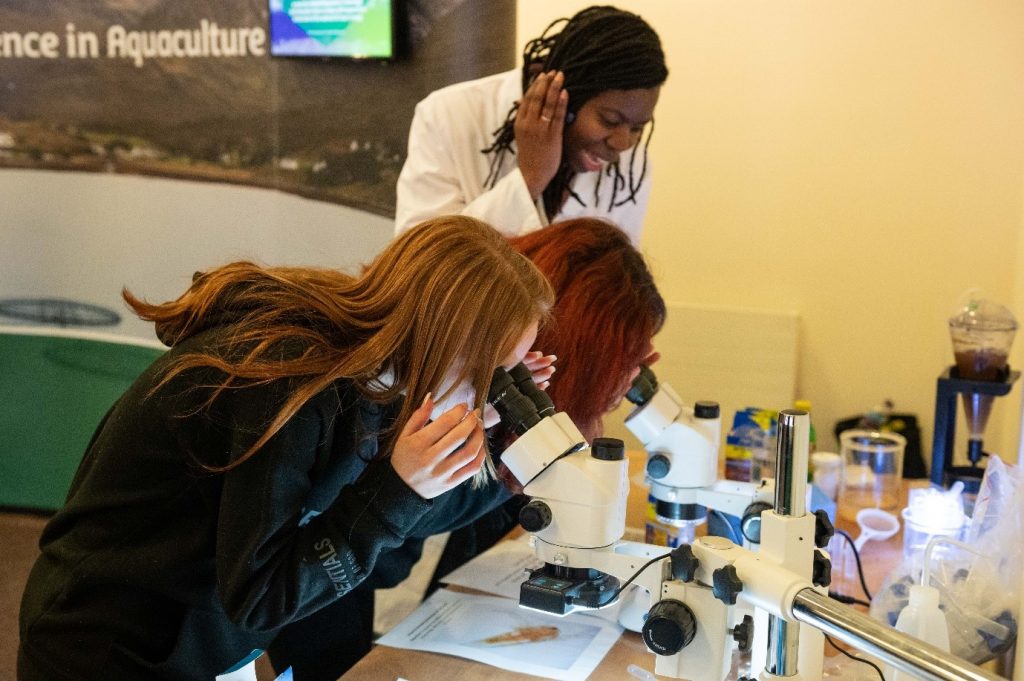In today’s world, where education and practical knowledge intersect, engaging young minds in the sciences is more crucial than ever. At the Institute of Aquaculture, University of Stirling, three outstanding lecturers, all women, are pioneering this effort through school outreach programmes. These initiatives not only bring science closer to young students but also highlight the diverse career paths within marine and aquatic sciences.
1. Dr Rose Ruiz Daniels: Inspiring Young Ichthyologists
Dr Rose Ruiz Daniels visited Kingsland Primary School in Peebles on February 29th, 2024, engaging with the eager minds of two P2 classes (Figure 1). Through her discussions on the life cycle of salmon, different aquaculture species, and the tools used to study fish behaviour, Dr Daniels captured the curiosity of her young audience.
“Children were particularly fascinated by the live Artemia and the various life stages of salmon preserved in formaldehyde,” Dr Daniels recalls. Her interactive approach helped demystify the science behind fish farming, answering numerous questions from the children about marine life and even touching on their personal experiences with pets and seafood preferences.

Figure 1: Dr Rose Ruiz Daniels
2. Dr Susan Fitzer: A Dive into Marine Biology and Climate Awareness
In February 2024, at Laurieston Primary School, Dr Susan Fitzer led an ‘Ocean Workshop’ for P3 pupils, introduced by Mrs Iona MacKay, a proud alumna of Stirling. With the ocean as their topic, Dr Fitzer explored the impact of climate change on marine ecosystems, particularly focusing on ocean acidification and its effects on shell-producing animals.
“Using cabbage juice as a natural pH indicator was a hit among the students,” Dr Fitzer shared. “It visually demonstrated how increased CO2 levels can affect ocean life.” This practical experiment not only highlighted the changes in seawater chemistry but also sparked discussions on environmental responsibility and the conservation of marine biodiversity (Figure 2).

Figure 2: Dr Susan Fitzer with P3 pupils
3. Dr Amina Moss: Showcasing STEM Careers at MAK STEM Fest
On February 21st, 2024, Dr Amina Moss participated in the inaugural MAK STEM Fest at the Machrihanish Airbase Community Company Business Park, which aimed to expose over 140 secondary students to the diverse opportunities within STEM fields. The event, supported by various organizations including ScottishPower Renewables, included workshops that were both educational and engaging.
Dr Moss’s workshops provided hands-on experiences where participants were able to analyse water samples for ammonia content and salinity levels, as they learnt about the importance of water quality. Additionally, with the use of microscopes, students observed the life stages of Artemia, from cysts to adults with eggs (Figure 3). “These interactions are vital for inspiring the next generation of scientists and technologists,” explains Dr Moss, as she advocated for the importance of water quality in aquatic animal growth and welfare, as well as discussed how live feeds are used to grow the fish that we eat. She was accompanied by other Institute of Aquaculture Staff, Mr Chessor Matthews, Dr David Bassett and Dr Matthew Sprague who also showcased different aspects of aquaculture from feeds to displaying fish organs from dissected salmons.

Figure 3: Dr Amina Moss
The outreach efforts by Drs Daniels, Fitzer, and Moss, along with Mr Chessor Matthews, Dr David Bassett and Dr Matthew Sprague, are more than just educational activities; they are catalysts for inspiration and curiosity. Through their dedication, they are not only educating young minds about the significance of aquaculture and marine sciences but are also laying the groundwork for future scientists who might one day solve some of our planet’s most pressing problems. The Institute of Aquaculture at the University of Stirling continues to lead by example, demonstrating the power of community engagement and educational outreach in shaping a better future.

Figure 4: IoA Team at the MAK Stem event